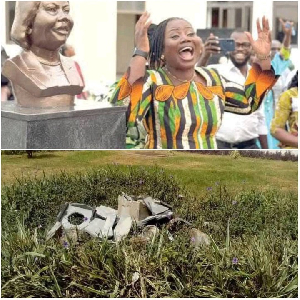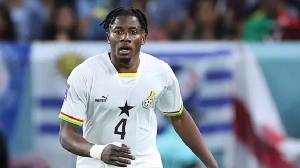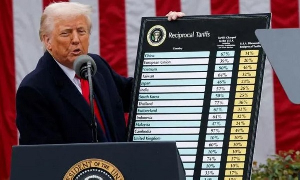Zeqblog Blog of Tuesday, 7 January 2025
Source: Okine Isaac
Just In: Controversy Erupts As Statue Of EOCO Director Is Torn Down Following Mahama's Swearing-In

According to the Ghanaweb report. The monument of Mrs. Maame Yaa Tiwaa Addo-Danquah, the Executive Director of Ghana's Economic and Organised Crime Office (EOCO), was destroyed barely moments after Ghana's President, John Dramani Mahama, was sworn in. This unexpected incident has sparked a whirlwind of comments on social media, with Ghanaians around the country expressing a mix of elation and outrage.
The statue, which had been erected to honor Mrs. Addo-Danquah for her service at EOCO, was reportedly toppled by anonymous individuals in what many believe was a symbolic act of protest or a reflection of the political upheaval that followed Mahama's inauguration. The incident has renewed debate about her term at EOCO and her perceived connection with the previous administration, led by Nana Addo Dankwa Akufo-Addo.
Social media responses have been highly different, highlighting the profound differences in public opinion. One person expressed their approval, saying, "Good news," and another said, "Good effort! The Akufo-Addo statue remains at Takoradi Roundabout. A third comment expressed a desire for responsibility, saying, "Waiting for her arrest." Criminality at EOCO has finally ended." These remarks highlight the conflicting perspectives on Mrs. Addo-Danquah's leadership and the larger backdrop of Ghanaian politics.
Mrs. Addo-Danquah was scrutinized and criticized throughout her time at EOCO, with some claiming that her investigations and enforcement actions were politically motivated. Critics accuse her of disproportionately pursuing opposition figures while protecting former government cronies. Her admirers, on the other hand, believe she carried out her duties professionally and made significant contributions to Ghana's fight against economic and organized crime.
Many see the removal of her statue as a symbolic rejection of her legacy and an indicator of the tense political atmosphere that has formed after the change in leadership. While some see the act as an important step toward accountability and justice, others see it as an unneeded and damaging gesture that undermines trust in public individuals and institutions.
This episode highlights larger considerations regarding how Ghanaian presidents' legacies are perceived after they leave power. It also exposes Ghana's deep political differences, where even emblems of service may become heated battlegrounds. The split in reactions to this tragedy highlights the nation's concerns as it navigates a new political terrain.
As news of the statue's removal spreads, many Ghanaians are waiting for formal statements from the EOCO, Mrs. Addo-Danquah, and the new administration led by President Mahama. This episode serves as a harsh reminder of the challenges of maintaining national unity and respect for institutions, especially during times of political change.
The reactions to this occurrence reflect the intricacies of Ghana's political atmosphere, in which history, legacy, and public perception are intertwined. As the country transitions to new leadership, the destruction of Mrs. Addo-Danquah's statue could spark broader debates about accountability, governance, and the role of prominent people in defining the country's destiny.


![Nana Ama Dokua Asiamah-Adjei,[L] Kwarteng and Tina Nana Ama Dokua Asiamah-Adjei,[L] Kwarteng and Tina](https://cdn.ghanaweb.com/imagelib/pics/895/89536549.295.jpg)











